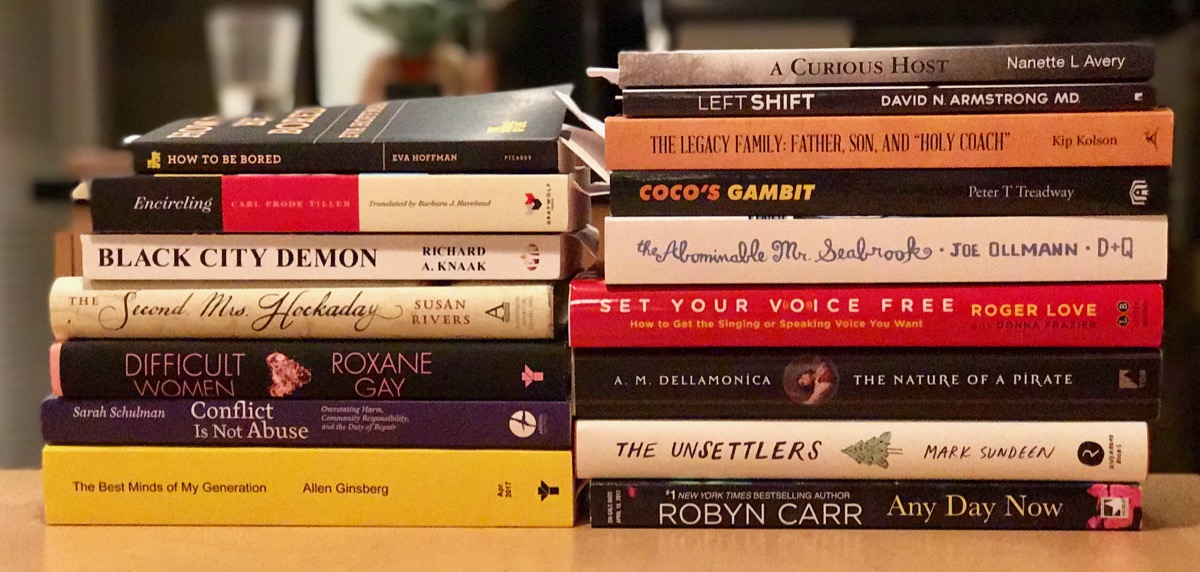Pharaoh
In the saltwater aquarium at the pain clinic
lives a yellow tang
who chews the minutes in its cheeks
while we await our unguents and anesthesias.The big gods offer us this little god
before the turning of the locks
in their Formica cabinets
in the rooms of our interrogation.We have otherwise been offered magazines
with movie stars whose shininess
diminishes as the pages lose
their crispness as they turn.But the fish is undiminishing, its face
like the death mask of a pharaoh,
which remains while the mortal face
gets disassembled by the microbes of the tomb.And because our pain is ancient,
we too will formalize our rituals with blood
leaking out around the needle
when the big gods try but failto find the bandit vein. It shrivels when pricked,
and they'll say I've lost it
and prick and prick until the trouble's brought
to the pale side of the other elbowfrom which I turn my head away —
but Pharaoh you do not turn away.
You watch us hump past with our walkers
with the tennis balls on their hind legs,your sideways black eye on our going
down the corridor to be caressed
by the hand with the knife and the hand with the balm
when we are called out by our names.
Remembering a New York now gone from an eye-witness
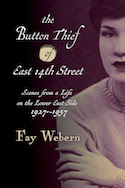
This week, Sagging Meniscus Press is back to show their new book from Fay Webern: The Button Thief of East 14th Street: Stories from a Life on the Lower East Side 1927-1957. It's an captivating work that captures New York at a vital time, seen from the inside.
We have a full, long chapter on our sponsor’s page, but we're embedding a YouTube video here, as well, of Webern reading a short chapter called "The Pretzel Lady at Union Square". We love her stories, and love hearing her tell them.
Sponsors like Sagging Meniscus make the Seattle Review of Books possible. Did you know you could sponsor us, as well? Get your stories, or novel, or event in front of our passionate audience. We only have two dates left in our current block. Take a glance at our sponsorship information page for dates and details.
Tourists in the time stream
Published December 19, 2016, at 11:56am
Time travel is a relatively new idea, but we've already worked very hard as a species to explore its outer limits as a concept.
A Bookseller's Holiday: Two journeys to the heart of ancient Rome
(Every Monday in December, we're asking a local bookseller which books they'd like to receive for a holiday gift. Our third bookseller is Jason Vanhee who works at University Book Store. Jason chose SPQR: A History of Ancient Rome by Mary Beard and Dynasty: the Rise and Fall of the House of Caesar, by Tom Holland.)
I work at University Book Store, but I’d been away for a few years and I just came back, so I didn’t see these in hardcover. I am a super-fan of Roman history and I’m really incredibly excited to get one or both of these as gifts. SPQR has been doing gangbusters — we had her for an event; I’m so sad I didn’t get to go, but I was working. I really can't wait to read some new [laughs] — “new” — Roman history.
The Sunday Post for December 17, 2016
My President Was Black: A history of the first African American White House — and of what came next
Few Seattle Review of Books readers will have missed Ta-Nehisi Coates’ epic, admiring, furious essay on Barack Obama’s presidency and the choice our country made just one eternal month ago:
The election of Donald Trump confirmed everything I knew of my country and none of what I could accept. The idea that America would follow its first black president with Donald Trump accorded with its history. I was shocked at my own shock. I had wanted Obama to be right.
I still want Obama to be right. I still would like to fold myself into the dream. This will not be possible.
Kudos to The Atlantic for continuing with a set of articles responding to Coates — frankly and with open eyes. Installations by Tressie McMillan Cottom and David Dayen launch the series.
Trump, Putin and the Pipelines to Nowhere
The climate change conversation is dominated by catastrophic weather patterns, extinction events, and photos of folorn polar bears. Behind the scenes, powerful economic forces are in play: deep investment around the world in the industries that support and rely the use of fossil fuels, and the risk of financial catastrophe on a global scale.
Alex Steffan argues that we already have the tools we need to meet the carbon restriction goals set in Paris last December, and with immense economic benefits. So whose interests, exactly, are served by keeping the carbon bubble full of hot air?
Scores of experts warn that the Carbon Bubble is one of the biggest threats to the global economy. The way to increase the resilience of global markets, they say, is to act on climate, but to do so with bold-yet-predictable pacing. If we do that — they say — we will still see the Carbon Bubble deflate, but markets should be able to adjust, and panic can be avoided. Climate action will stave off financial disaster as well ecological catastrophe.
This is a win-win for everyone, except those heavily invested in those Carbon Bubble assets now ... For them, the larger the Carbon Bubble swells, the more money they make.
Finding North America’s lost medieval city
An archeological dig revearls an ancient city under a quiet field in southern Illinois. Fearless reporter Annalee Newitz took shovel in hand to search for the cause of Cahokia’s demise.
The bones were the worst, because there were so many of them that it halted our digging dozens of times. We had to be careful to determine that these weren't human bones, because human remains must be reported immediately. Though we'd already identified these as deer bones, archaeologists will sometimes do a lick check to be sure. Lick check? I stared at Baires in bewilderment. “Do you want to lick it?” she asked.
A Short History Of The Most Important Economic Theory In Tech
On the 20th anniversary of the seminal article by economist W. Brian Arthur, Rick Tetzeli revisits the theory of increasing returns and how it’s fueled the success of tech giants from Microsoft to Amazon to Uber. With a cameo by Cormac McCarthy:
"I mailed the draft down to Cormac, who was in El Paso or somewhere like that. When I didn’t hear from him, I called him up and said, ‘Did you like my increasing returns article? It’s for the Harvard Business Review.’ There was kind of a silence on the line. And then he said, ‘Would you be interested in some editing help on that?’"
John Luther Adams on Translating Birdsong and Paying Attention to the World’s Immensity
A week after Patti Smith performs “A Hard Rain’s a Gonna Fall” at the Nobel Prize ceremony in Stockholm, two short takes — barely a mouthful each — on music, joy, and protest:
Composer John Luther Adams has built his life’s work on what he hears through an open window.
I began sketching on my first trips in Alaska. That summer of 1975, I began sketching immediately, writing down birdsongs as best as I could and trying to capture, to translate, to evoke something of the feeling of the air and the light and the wind. Initially, I began with a kind of landscape painting in music and immediately I thought, “Well, this is what I’m going to do for the rest of my life.”
And a sketch in the margins of a circa 1500 folio of the Consolation of Philosophy captures the constancy — over centuries — of delight as an act of defiance.
As if to remind us of the necessity not only of philosophy, but also of song in dark times, our anonymous reader drew a “rockstar lady,” whose pose connotes nothing but pure joy. We could juxtapose her with the joyful guitar poses of any number of modern blues and rock stars, who have played through any number of dark times.
Codex Valtierra - Relaunch: Kickstarter Fund Project #50
Every week, the Seattle Review of Books backs a Kickstarter, and writes up why we picked that particular project. Read more about the project here. Suggest a project by writing to kickstarter at this domain, or by using our contact form.

What's the project this week?
Codex Valtierra - Relaunch. We've put $20 in as a non-reward backer
Who is the Creator?
What do they have to say about the project?
What if the Aztecs won the war against the Spaniards? A wonderful illustrated tale for kids and adults.
What caught your eye?
In the grand tradition of the modern revenge narrative, comes the mother of all revenge narratives: what if the Aztecs had chased away the Spaniards? Illustrator Emmanuel Valtierra has reimagined Aztec stories using the visual storytelling techniques from the Aztec codecs.
If you like to wonder what the Americas may have been like if the European invaders had been kept at bay — and who hasn't? — then I guess the question I have for you is: did you imagine it told entirely in pictures?
Why should I back it?
The work looks gorgeous. It's a great idea, that looks well executed, and the ask is completely reasonable.
How's the project doing?
36 days to go and 56% funded! That's a good trajectory — get your money in.
Do they have a video?
Kickstarter Fund Stats
- Projects backed: 50
- Funds pledged: $1000
- Funds collected: $800
- Unsuccessful pledges: 3
- Fund balance: $40
The Help Desk: Locker room talk and the arts
Every Friday, Cienna Madrid offers solutions to life’s most vexing literary problems. Do you need a book recommendation to send your worst cousin on her birthday? Is it okay to read erotica on public transit? Cienna can help. Send your questions to advice@seattlereviewofbooks.com.
Dear Cienna,
I’m writing because a loudmouth white man has too much power. (Not THAT loudmouth white man, though if you have any advice on surviving Donald Trump’s administration I’d love to hear it.) I’m talking about a guy who holds a very high position in a Seattle arts organization.
The problem is his locker room talk. He’s never to my knowledge made unwelcome advances on a woman, but he’s prone to making jokes around women that make them feel uncomfortable. This has happened more than once, and I hear he’s been reprimanded for it, but he’s still in a position of power that affects local writers, and we can’t really ask him if he’s stopped making sex jokes, so there’s no way to know if the coast is clear. Everything has happened behind the scenes, and there’s never been any public acknowledgement.
Like I said, there’s no groping and no smarmy come-ons, but the sexual nature of the jokes make it very difficult to deal with him. I don’t know if I want him to lose his job, but I do know of at least one artist who won’t work with that organization because of the way he made her feel in the past, and he’s made no attempt to reach out to her.
I guess I’m hoping for some fictional scenario in which he sees this question, realizes it’s him, and cuts it out forever. But barring that miraculous outcome, what do you think I (and my friends and fellow artists) should do?
Sorry if this question is too vague.
Cait, Capitol Hill
Dear Cait,
Your letter reminds me of an old friend – a human one – who often says things that are so inflammatory and sexual my shoulders cramp from cringing. When in the company of this friend and strangers, what I typically do is make excuses for him: most of his close friends are women, which I believe in his mind is proof that he is harmless, and like all of us, he is cultivating an image of himself – that of a loudmouth, boundary-pushing dude adrift in eye-contactless, passive aggressive Seattle. He's fond of locker room talk but unlike Trump, he's no pussy grabber.
In fact, that is why we became friends. He is a man with whom I could joke about naming my next abortion "Lezbo" in order to offend everyone equally.
But that doesn't excuse his behavior, just as it doesn't excuse the behavior of the man you speak of. It seems this man has failed to acknowledge that his ambition is paying off – instead of being just another 20-something arts employee that people could ignore at will, he now holds a position of power. His words and actions carry weight. Cocking off at work, or after work with coworkers, artists and interns, is no longer even marginally socially acceptable.
You say it's been all talk at this point and he's been reprimanded for his behavior; it has cost him influence and professional relationships. I would hope that he has learned from this. But if I'm wrong, you should encourage those he's offended to go public with their grievances. The best way to affect institutional and social change is to address problems openly. It's also the only fair way to give the person you've accused of wrongdoing a chance to respond.
And if he still seems oblivious, I will meet you at University Book Store, where together we can purchase a copy of Strange Justice: The Selling of Clarence Thomas, wrap it in the book sleeve of Who Moved My Cheese, and beat him across the face with it.
Kisses,
Cienna
Lunch Date: Taking Normal out to brunch

(Once in a while, I take a new book with me to lunch and give it a half an hour or so to grab my attention. Lunch Date is my judgment on that speed-dating experience.)
Who’s your date today? Normal by Warren Ellis.
Where’d you go? Roxy's Diner, in Fremont.
What’d you eat? I had the Roxy's Deli Scramble with corned beef, sauerkraut, and Swiss cheese ($12.95)
How was the food? Holy cow. Ever since the I Love New York Deli went out of business a few years back, I've been looking for a good Jewish deli in the Seattle area. (My favorite is Goldberg's, in Factoria.) Turns out, Roxy's has been serving up really fine diner fare for a decade and a half. The food is plentiful, tasty, and relatively affordable. I'll be coming back here for a Reuben as soon as I think my arteries can handle it.
What does your date say about itself? From the publisher’s promotional copy:
There are two types of people who think professionally about the future: Foresight strategists are civil futurists who think about geoengineering and smart cities and ways to evade Our Coming Doom; strategic forecasters are spook futurists, who think about geopolitical upheaval and drone warfare and ways to prepare clients for Our Coming Doom. The former are paid by nonprofits and charities, the latter by global security groups and corporate think tanks.
For both types, if you're good at it, and you spend your days and nights doing it, then it's something you can't do for long. Depression sets in. Mental illness festers. And if the abyss gaze takes hold there's only one place to recover: Normal Head, in the wilds of Oregon, within the secure perimeter of an experimental forest.
Is there a representative quote?
Adam stood there and wondered what it would be like to live at Normal Head forever, like Colegrave. Would it feel like being trapped? Or would it feel like being free? There was a lot of space. There was a forest. There was so much silence. The quiet felt like a huge new country that he could wander around inside for years without ever meeting its coastlines. A silence the size of the wky. If he stayed here long enough, he'd eventually be sent to Staging, and he'd have one of those simple, clever micro-homes to live and work in. There would be internet, and books, and music. He could think, and be, and hold the world at a distance in order to see it properly. Nothing would ever hurt or frighten him again. The micro-home of his very own could be his hermit's cave. He could be a wise man of the woods, spoken of in whispers, his words and thoughts becoming spooky action at a distance in the world beyond. A secret wizard of the future.
Will you two end up in bed together? Yeah, In fact, as I'm writing this a day after the meal, I've already finished the book. Normal is a novella that was originally published in four serialized chapters, and it's a quick read. The premise of Normal is a lot of fun: imagine if all the douchiest TED Talk prognosticators wound up in One Flew Over the Cuckoo's Nest. Ellis uses the premise to plug in a bunch of great little riffs about the internet and drones and modern life, and he's clearly enjoying himself. Like a lot of latter-day Ellis work, Normal doesn't so much end as fade away, but it's a lot livelier than other books he's written lately. If you're on the fence with Ellis's recent work, Normal might just remind you why you loved his big, beautifully deranged brain in the first place.
Portrait Gallery: Luzviminda Uruzi “Lulu” Carpenter
Each week, Christine Marie Larsen creates a new portrait of an author for us. Have any favorites you’d love to see immortalized? Let us know

Monday December 19th
The Beautiful Struggle
In a conversation facilitated by the good people at Seattle Public Library, Luzviminda Uruzi “Lulu” Carpenter leads Seattle-area LGBTQ leaders (including Dominique Stephens, Luis Fernando Ramirez, and Sonj Basha) in a conversation about surviving violence of all stripes (racism, transphobia) and building communities together.
Gay City, 517 E Pike St., 860-6969, http://spl.org. Free. All ages.
Book titled "Thrill Me" actually more comforting than thrilling
Over at the Ploughshares blog, Seattle writer Ian Denning wrote an excellent piece about Benjamin Percy's how-to-write guide, Thrill Me. Denning recalled my review of Percy's craft talk at the Hugo House from last year, in which I was thoroughly unimpressed by the unoriginality of Percy's advice. Denning makes the argument that while Percy's advice may lean toward the oft-repeated, his "good-but-not-groundbreaking craft book" could serve as "a cheerleader" to comfort an aspiring writer.
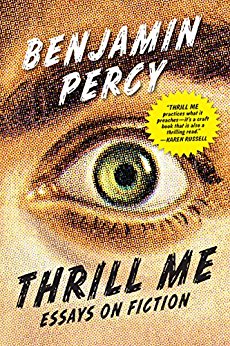
Thrill Me, as Denning notes, is very similar in tone to the craft lecture that Percy delivered at Hugo House last year. (In fact, the talk Percy gave appears in the book.) That means you shouldn't expect too much originality here. If you've read other how-to-write books, you won't find anything too thrilling in Thrill Me. Instead, you'll be told to read deeply and carefully, to show and not to tell, to "Mine your past" and "Never give a generic desciption." We're advised to not get too gory in the writing of horror scenes because the action in a reader's imagination is usually ghastlier than anything any writer could ever portray. Percy says that the stakes must be high and that conflict is the heart of story. It's all been said before, and better.
That said, as Denning points out, there's a place for this kind of generic advice. If, like me, you find comfort in reading about writing, Percy's boundless energy for generic writing advice would likely serve as an inspiration to you. And if you've never read a writing advice book, Thrill Me does cover all the basics; this is a book that could change a sheltered young writer's life, assuming that writer then goes out and finds texts by more imaginative and stylistically gifted writers to guide their way.
Look: everybody needs the basics explained to them every now and again. It helps to break a craft down to its simplest components and see how everything works. In that respect, Thrill Me is a terrific guide — a remedial class led by a patient and enthusiastic teacher. If you're looking for nuance or originality or artfulness, you'll want to dig a little further into the how-to-write section of the bookstore, but if you're looking for someone to tell you what you already know in a gentle and affirmative voice, Thrill Me is the book for you.
Local cartoonist Sarah Glidden, whose excellent book Rolling Blackouts depicts a journey through the Middle East with reporters from the Seattle Globalist, has created an animated movie explaining why you should donate to the Globalist today.
You can — and should — subscribe to the Globalist here.
Thursday Comics Hangover: A library full of empty books
One Week in the Library comes in a format that doesn’t get enough play in comics shops: a ten dollar “graphic novella” that tells a single story from beginning to end. It’s a great format — not quite long enough to be a full-sized graphic novel, but longer than your standard monthly comics issue. More cartoonists should work at this size; it’s a great length for the medium.
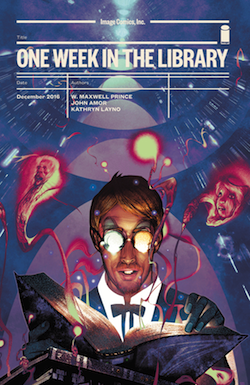
Unfortunately, One Week at the Library isn’t the best advertisement for the format. By which I mean it’s a bad book. Written by W. Maxwell Prince and illustrated by John Amor, Library is the story of a librarian who works, alone, in an imaginary library. (“…the SAD ENCYCLOPEDIAS are in the Happy Corridor, which also houses the MISERY CHRONICLES, which themselves are part of THE SERIES OF IMPOSSIBLE JOY.”) The book is divided into seven chapters — one for each day of the week — and each chapter employs a different formal technique: one chapter tells a story in diagrams, another is prose, another is wordless, and so on.
You’ve seen this before. Library feels kind of like a Sandman knockoff, a story about the power of stories. But unlike Sandman, the stories never really grow beyond their concepts. They’re stories about stories for the sake of stories, and they just sort of sit there on the page, all vapid flash and shallowness.
Toward the end of the book, Prince writes himself into the story and frets over whether the reader will think he’s smart. To which I reply: if you want a reader to think you’re smart, maybe don’t quote Doors lyrics in your story. And a book about the depth and breadth of libraries should feel as though it was written by someone who has explored those depths. The literary references in Library are facile (Charlotte’s Web and Lewis Carroll get repeated shout-outs) and the library conceit disappears entirely at various points.
The Prince character self-consciously acknowledges the many comics writers who have appeared in their own books in the past, including Grant Morrison, and he whines that “I’m suffering a ton of anxiety that someone reading this will think I’m being lazy or derivative.” Unfortunately, simply acknowledging a critical complaint in a story isn’t enough to disarm that complaint, and writing a book about books isn’t enough to inspire warm literary feelings in a reader. The books in this library feel strangely empty of value.
Sam Jordison's essay in the Guardian about how Fight Club activated a generation of young white men and turned them into trolls, Trump fans, fascists, and Gamergaters is well worth your time:
Rereading the novel in 2016 is chilling. Researching the book online, I found myself falling down a dark wormhole of fascistic websites that quote big chunks of David Fincher’s film adaptation as parts of their credo; even though parts are almost verbatim from the book, alt-right types tend to quote the film – because they either don’t agree with the overall message of Palahniuk’s book or they haven’t bothered to read it.
I came across Jordison's essay via a Max Gladstone's tweet-thread, which started here:
1999, me: "Fight Club is a movie about challenges facing men in 20th c"
— Max Gladstone (@maxgladstone) December 14, 2016
Dad: "This movie is about how fascist movements get started." https://t.co/jwRTxOGx9V
Related: I wonder if it ever occurs to the alt-right/Gamergate/MGTOW communities that their two seminal texts are Fight Club and the Matrix — in other words, a novel about toxic masculinity by a gay Portland author, and a film by diversity-loving transgender writer/directors? Does it ever occur to them that their entire ideology is based on a misreading of the surface elements of those two texts? If they were to realize this, do you think it would bother them at all?
Your Week in Readings: The best literary events from December 14th - December 20th
Wednesday December 14th: Lit Fix and Origin Stories
See our Literary Event of the Week column for more details.Thursday December 15th: Hola and Goodbye Reading
Seattle author Donna Miscolta’s new book of linked short stories, Hola and Goodbye follows multiple generations of women in a Latinx family as they come to America and forge new paths for themselves, facing tremendous sexism, racism, and economic barriers. This is a heartfelt American story that was published at exactly the right time. Third Place Books Seward Park, 5041 Wilson Ave S, 474-2200, http://thirdplacebooks.com. Free. All ages. 7 p.m.Saturday December 17th: Holiday Story Time
Elliott Bay Book Company traditionally hosts kids’ readings on Saturday mornings. (They’ve been much better-attended since the store moved from Pioneer Square to Capitol Hill.) The final edition of the year is a special holiday-themed reading for kids read by “a local Seattle actor.” Elliott Bay Book Company, 1521 10th Ave, 624-6600, http://elliottbaybook.com . Free. All ages. 11 a.m.Monday December 19th: The Beautiful Struggle
In a conversation facilitated by the good people at Seattle Public Library, Luzviminda Uruzi "Lulu" Carpenter leads Seattle-area LGBTQ leaders (including Dominique Stephens, Luis Fernando Ramirez, and Sonj Basha) in a conversation about surviving violence of all stripes (racism, transphobia) and building communities together. Gay City, 517 E Pike St., 860-6969, http://spl.org. Free. All ages.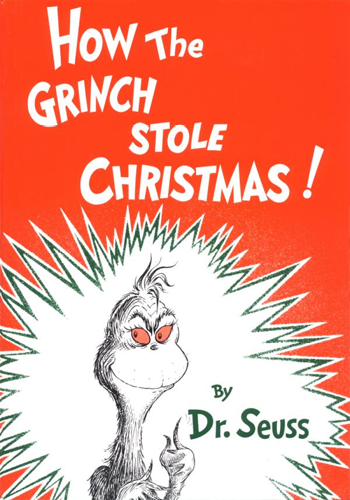
Tuesday December 20th: How the Grinch Stole Christmas Reading
How the Grinch Stole Christmas is a holiday classic that even managed to survive the apocalyptic threat of that Jim Carrey-starring abomination that Hollywood shat up a while back. Today, University Book Store hosts a reading of Dr. Seuss’s Christmas classic for young audiences. Take part in the tradition. University Book Store, 4326 University Way N.E., 634-3400, http://www2.bookstore.washington.edu/. Free. All ages. 11 a.m.Literary Event of the Week: Beat back the holiday doldrums with Lit Fix and Origin Stories
We’re coming up on the end of the year, and the number of available literary events are rapidly declining. Don’t get me wrong — there are still plenty of readings between now and the end of the year, but this is the one time of year when literary-minded folks are not spoiled for choice: rather than three or four good options a day, Seattle’s readers readers are lucky to get one. This must be what it’s like living in basically every other city in America.
In fact, it’s looking like Wednesday, December 14th is the last day of the normal Seattle reading calendar for 2016. It’s a big blowout of a night, with two different group readings happening on Capitol Hill, and it’s your best opportunity for a fun literary event for the next three weeks or so.
First up is the 15th installment of the Lit Fix reading series at Chop Suey. Here’s what the $5 cover at the door will get you: You’ll enjoy a rare Seattle appearance from Brooklyn novelist Leland Cheuck, whose The Misadventures of Sulliver Pong follows one Asian-American family, Forrest Gump-like, through some of the darkest moments in American history (the building of the transcontinental railroad, the internment of Japanese-American citizens during World War II.) Cheuck is joined by Seattle writer Steven Barker — whose memoir about working in the temp economy, Now for the Disappointing Part, is anything but disappointing — and the remarkably prolific Lori A. May. Seattle native Sasha LaPointe, who is best-known for her accounts of her Nooksack heritage and intergenerational trauma, capably rounds out the docket.
Like most Lit Fixes, this is a reading that celebrates writers at just the right point in their careers: when they have a book or two under their belts and they’re just starting to develop a real following. If you want to see tomorrow’s superstars in a casual, supportive environment, Lit Fix is for you.
But there’s another group reading that can’t be ignored happening across town at the Pine Box at the exact same time. Four terrific Seattle writers, each of whom enjoys a strong and devoted following, join forces to read new work along the theme of “Origin Stories.”
These are names you see a lot around town: Bellingham poet Robert Lashley, Seattle poets Sarah Galvin and Michelle Peñaloza, and Jessica Mooney, an up-and-coming writer of short fiction. Any one of these writers could headline any number of events around town, but the four of them together should make for an unforgettable evening, especially since they’re sharing new work having to do with origins, which is an incredibly potent starting point for a shared group reading. Expect personal work about pivotal decisions in the lives of these terrific writers.
There’s always a little manic energy around readings at this time of year. The audiences can get a little thin because there’s an office Christmas party or family matters that need attention. Writers are pre-annoyed by all the gaudy consumerism in the air. And the folks who do show up are likely to be misanthropic and sick of all the ceremony of holidays. In other words, late-year readings are the perfect recipe for a memorable evening. Go out and make something happen.
Is there a better lede than this in all of journalism this week? I think not:
Exalted writer Natsume Soseki has returned as an android 100 years after his death and is reciting his own work.
In case you're worried about the world of Do Androids Dream of Electric Sheep coming true, video of the Soseki android indicates that a lot of progress needs to happen between the present day and a workable lifelike automaton:
This year's Black List Awards, which celebrate the greatest unproduced screenplays, were announced yesterday. Coincidentally, two Black List winners share a very interesting muse. Here's a description of Kathy Charles's screenplay The Kings of Maine:
Living with his wife and child in a trailer while working as a janitor, Stephen King struggles with alcoholism and his own dark history as he attempts to complete Carrie.
And here's the plot synopsis for Maximum King!, by Shay Hatten:
An outlandish, surreal imagining of how in 1985 Stephen King wrote and directed his horror classic MAXIMUM OVERDRIVE.
We could be about to enter a Stephen King renaissance; from biopics to absurdist comedy, something about King is in the zeitgeist right now.
Heidi MacDonald at the indispensible comics news blog The Beat reports on a petition to unseat Wonder Woman as an honorary ambassador at the United Nations. The petition blasts Wonder Woman's "overtly sexualized image" for "not [being] culturally encompassing or sensitive." It seems that the petition was successful — Wonder Woman is no longer considered to be a UN ambassador, though it's unclear how any fictional character can serve as an ambassador in the first place.
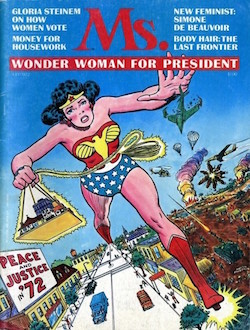
One issue the petition did not cite that seems relevant: it's highly squicky that the United Nation decided to privilege a corporate intellectual property with this kind of platform. MacDonald says that DC Comics had plans for the ambassadorship leading up to the launch of the Wonder Woman film next year. I'm all for Wonder Woman as a symbol — the fact that she was on the cover of the first issue of Ms. Magazine was a huge moment in feminist pop cultural history — but there's a difference between celebrating a superhero's folk status and promoting brand awareness for a multinational entertainment conglomerate. The idea of an international leadership role for women serving as synergy for a blockbuster movie is more than a little distasteful.
"Dona"
Many of the Girl Scout songs
extorted a smile, our servile mugging —
but this one we loved best.
Starring a calf being hauled in a minor key,
its refrain two mournful syllables: dona.
First came the long o — in induction/seduction
to join the animal's cargo cult, then came
the short a, when the calf turned to beef
with no last meal and no reprieve.
The gist of the lyric: that we could choose
to be the calf in the cart or the bird in the sky;
the idea was simple, but also a lie: dona.
Bird is small and can fly where it wants
but it'll never be Miss Teen USA,
whereas the word abattoir was a chic French Kiss
our tongues would enter willingly.
Let that bird flitter off
like a dry dead leaf: this was a hymn
that we sang on our knees
on the dais by the flag, dressed in our sashes
and green berets like irregulars planning
a suicide mission: there was glory ahead
when we signed on, clambered into the wagon,
and let the future hitch up its horse.
